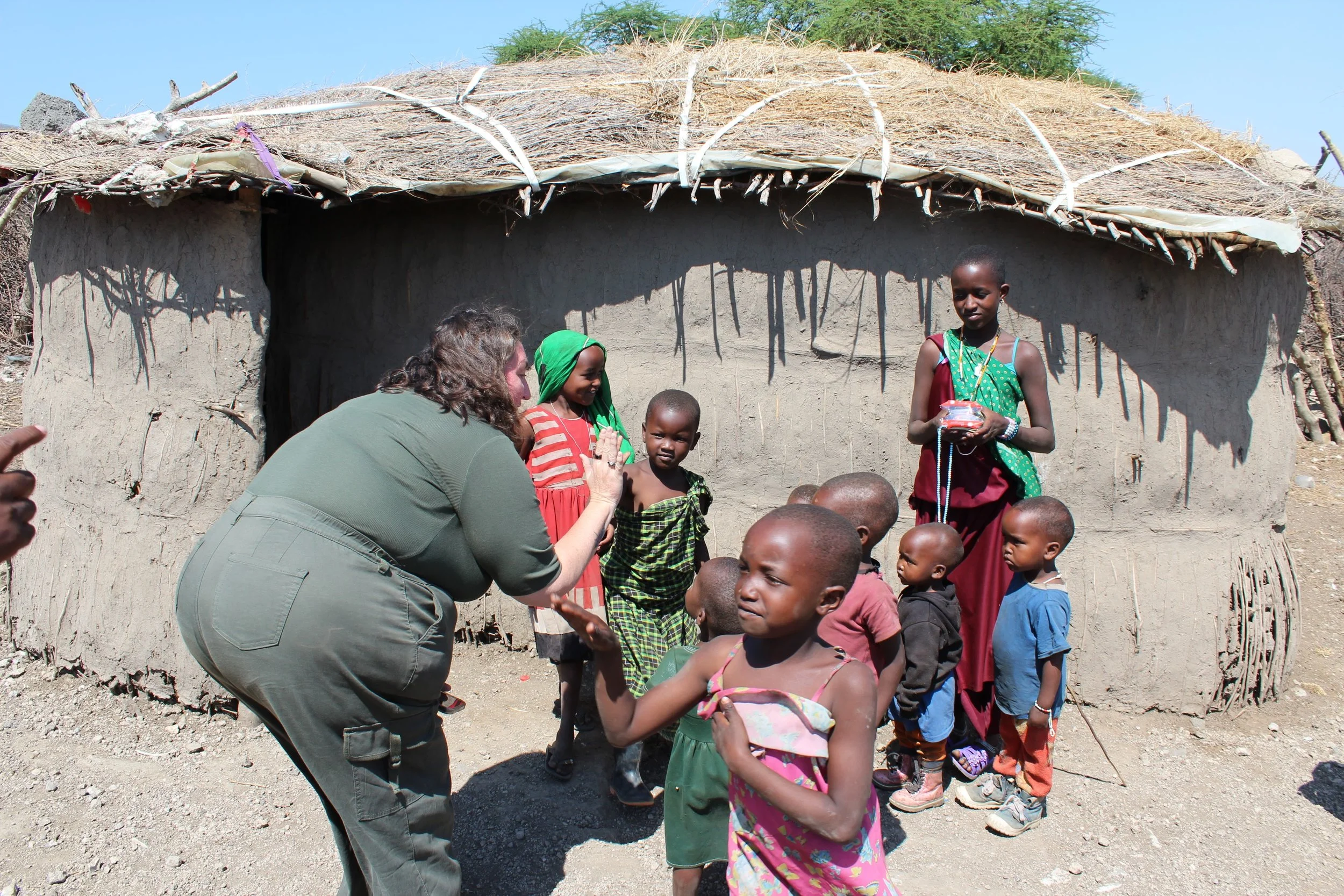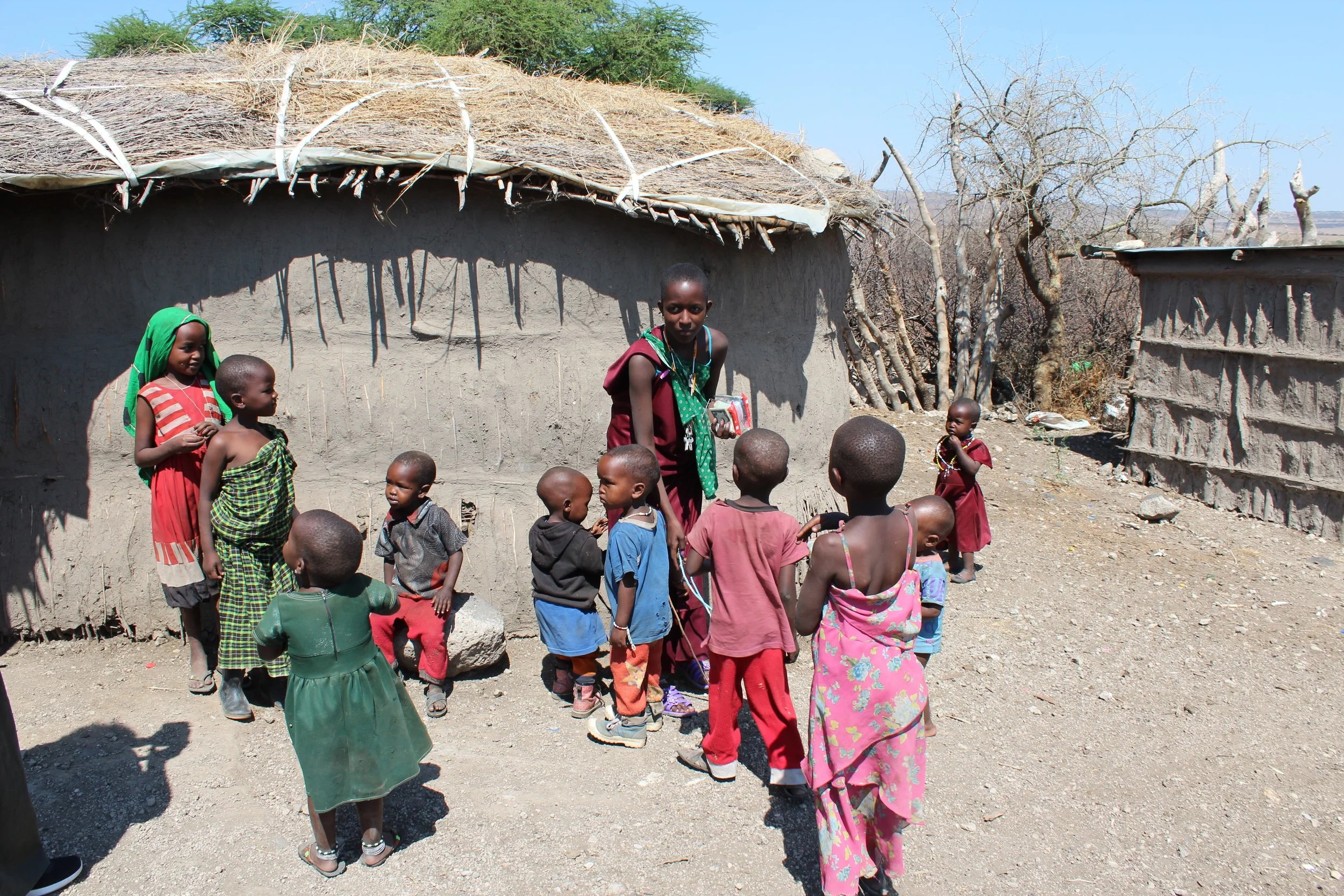Beyond the Bucket List: Finding Purpose in Paradise
His tiny hand hung in the air, waiting for my high-five. Around us, the Tanzanian sun painted long shadows across the red earth of the Maasai village, where children’s laughter echoed off mud-and-stick homes and the air smelled sweet with acacia wood smoke from the fire. I reached out, our palms met, and for a moment, everything else fell away – the weight of my backpack, my carefully chosen safari outfit, my Western self-consciousness. Just pure connection, pure joy.
My husband captured that moment on camera. Later, scrolling through photos in our camp, I stopped at that image. But instead of seeing the magic of that connection, my first thought was, “Man, I look so fat.”
Fifty years old, standing in one of the most remarkable places on Earth, making a small difference in the world – and there I was, letting societal programming about women’s bodies steal that moment’s power. The revelation hit me like a splash of cold water: How often do we let surface-level noise drown out what really matters?
This moment of clarity came during what many would call a “bucket list” trip – a safari in Tanzania and Zanzibar to celebrate my 50th birthday. But this journey taught me something far more valuable than checking off a travel dream. It showed me the difference between performing good and pursuing purpose, between Instagram-worthy charity and genuine impact.
It started with a choice. When selecting a safari company, I could have gone with any number of luxury operators promising the “authentic Africa experience.” Instead, I chose Sababu Safari, a small, locally-owned business whose tagline – “travel with purpose” – proved to be more than marketing. Their approach revealed how conscious choices about where we spend our money can ripple outward in ways both subtle and profound.
But here’s the thing about purpose: it’s not something you can pack in your suitcase and pull out for a photo op. Those solar lanterns we brought to the Maasai village? Those washable menstrual pads and cleft palate bottles we delivered to the local NGO? They matter. They help. But if that’s where our engagement ends, we’re missing the point entirely.
The truth is, you don’t need to travel to Africa to make a difference. You don’t need to “save” anyone. In fact, that white savior complex – the idea that we can swoop in with our Western solutions and fix everything – is part of the problem. Real change, lasting impact, happens in the daily choices we make, in how we show up in our own communities, in the ways we use our voices and resources where we are, right now.
During our time with Sababu Safari, I watched how our guide, Mohamad, interacted with each village and community we visited. This wasn’t the superficial stop-and-snap tourism I’d feared. He knew people’s names. Asked about their children. Spoke about ongoing projects and challenges. But it went deeper than that – Mohamad’s commitment to his community revealed itself in countless small moments between the grand vistas and wildlife sightings. He’d pause to mentor newer guides, sharing his deep knowledge of the land. Once, he delayed his own schedule to ensure a less experienced guide made it safely to camp before dark. Each interaction reflected not just professional courtesy, but a profound pride in his home and its people. The relationship wasn’t built during a single safari stop but over years of consistent engagement, mutual respect, and genuine partnership.
It made me think about how different this was from what I call “drive-by philanthropy” – the kind where we drop off donations, take a few photos, and leave feeling good about ourselves. Don’t get me wrong: those solar lanterns we brought will make a real difference. In a village without electricity, they mean children can study after dark, women can more safely navigate at night, and families can extend their productive hours. But the lanterns aren’t the whole story. They’re just one point of light in what needs to be a constellation of sustained action.
Here’s what I mean: Back home, I lead initiatives in healthcare innovation and AI literacy. Every day, I see how lack of access to healthcare and education creates ripples of inequality that span continents. The challenges faced by that Maasai village – limited electricity, clean water concerns, healthcare access – aren’t just “African problems.” They’re human problems. Versions of them exist in every community, including our own.
So how do we move beyond the performance of doing good to create lasting impact? Here’s what I’ve learned:
Start Where You Are
You don’t need to travel halfway around the world to make a difference. Look at your own spending habits. Which local businesses align with your values? Where can your daily choices support community-based initiatives? When I needed a new coffee shop for my morning meetings, I chose one that employs and trains formerly incarcerated individuals. Small choice, bigger ripple.
Use Your Professional Platform
Whatever your field, there are ways to weave impact into your work. A lawyer might offer pro bono services. A teacher might integrate social justice into lesson plans. In my work with AI and healthcare, I continuously look for ways to make these technologies more accessible and equitable. Your professional skills are a powerful lever for change.
Build Lasting Relationships
True impact isn’t about swooping in with solutions – it’s about showing up consistently. Join local boards. Mentor young people. Volunteer regularly at organizations addressing root causes, not just symptoms. The key is commitment over time, not intensity in a moment.
Challenge the Narrative
Remember that photo that initially made me focus on my appearance rather than the moment’s meaning? It’s a reminder to constantly question the narratives that distract us from what matters. Whether it’s beauty standards, consumerism, or oversimplified solutions to complex problems, we need to recognize and resist these diversions.
Make Your Money Talk
Before booking our safari, I spent hours researching companies’ impact on local communities. This shouldn’t be just a vacation consideration. Where does your retirement fund invest? Does your bank support community development? Are your vendors aligned with your values? Every dollar is a vote for the kind of world we want to create.
As I write this, that photo of the high-five sits on my desk. Now I see it differently. I see connection. Joy. Possibility. But most importantly, I see a reminder that creating change isn’t about grand gestures or perfect photos. It’s about showing up, day after day, in all the small ways that add up to something bigger than ourselves.
Because here’s what I know for sure: The world doesn’t need more people taking poverty tourism photos or making one-time donations. It needs people committed to the long game of change – people willing to examine their daily choices, challenge their assumptions, and consistently direct their resources toward building a more equitable world.
That high-five wasn’t just a moment of connection with a child in Tanzania. It was a wake-up call, a reminder that we can’t let superficial concerns or performative charity distract us from the real work of creating change. The question isn’t whether you can travel to Africa and help a village. The question is: How are you showing up, every day, to help build the world we all want to live in?
What will your answer be?


